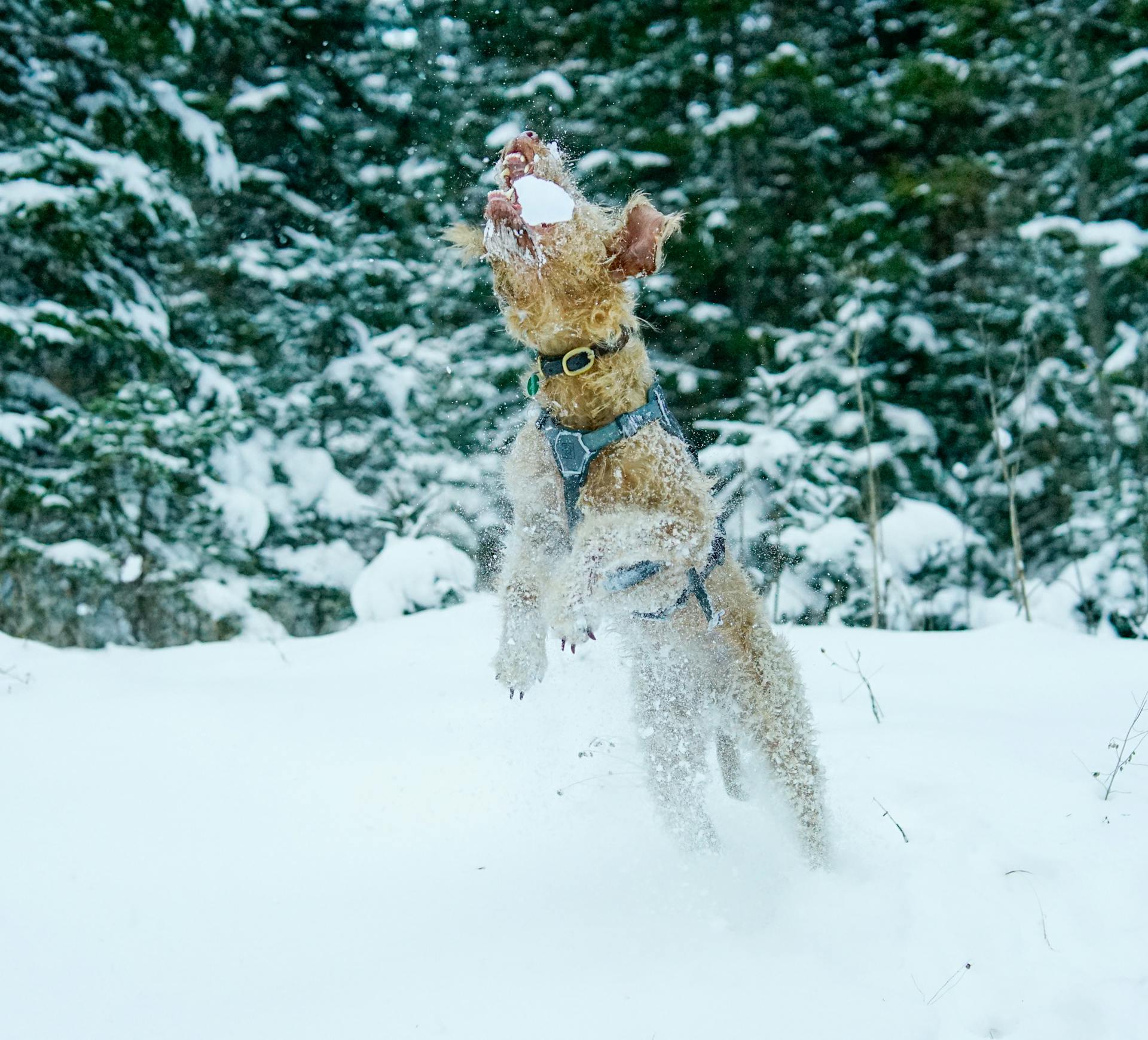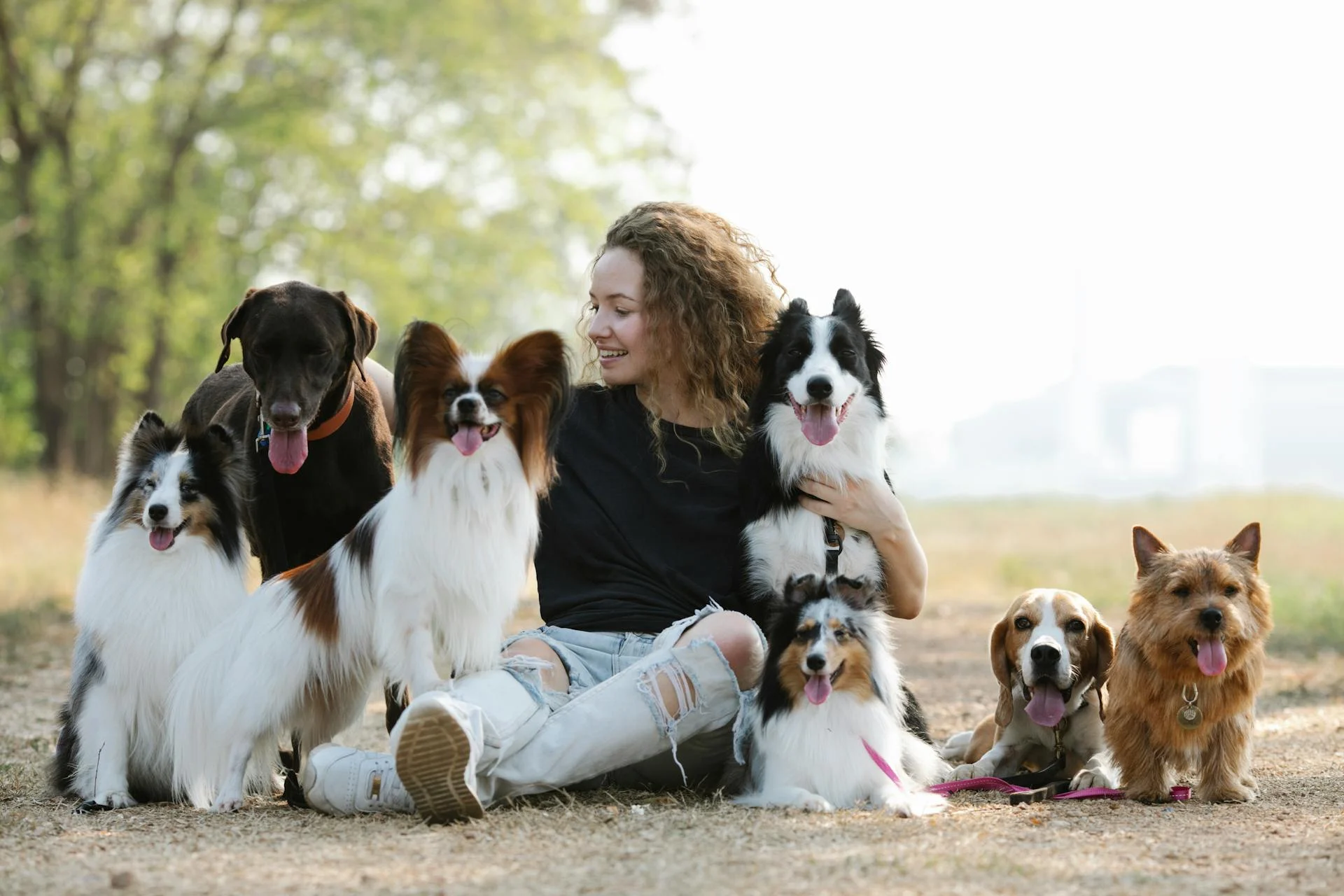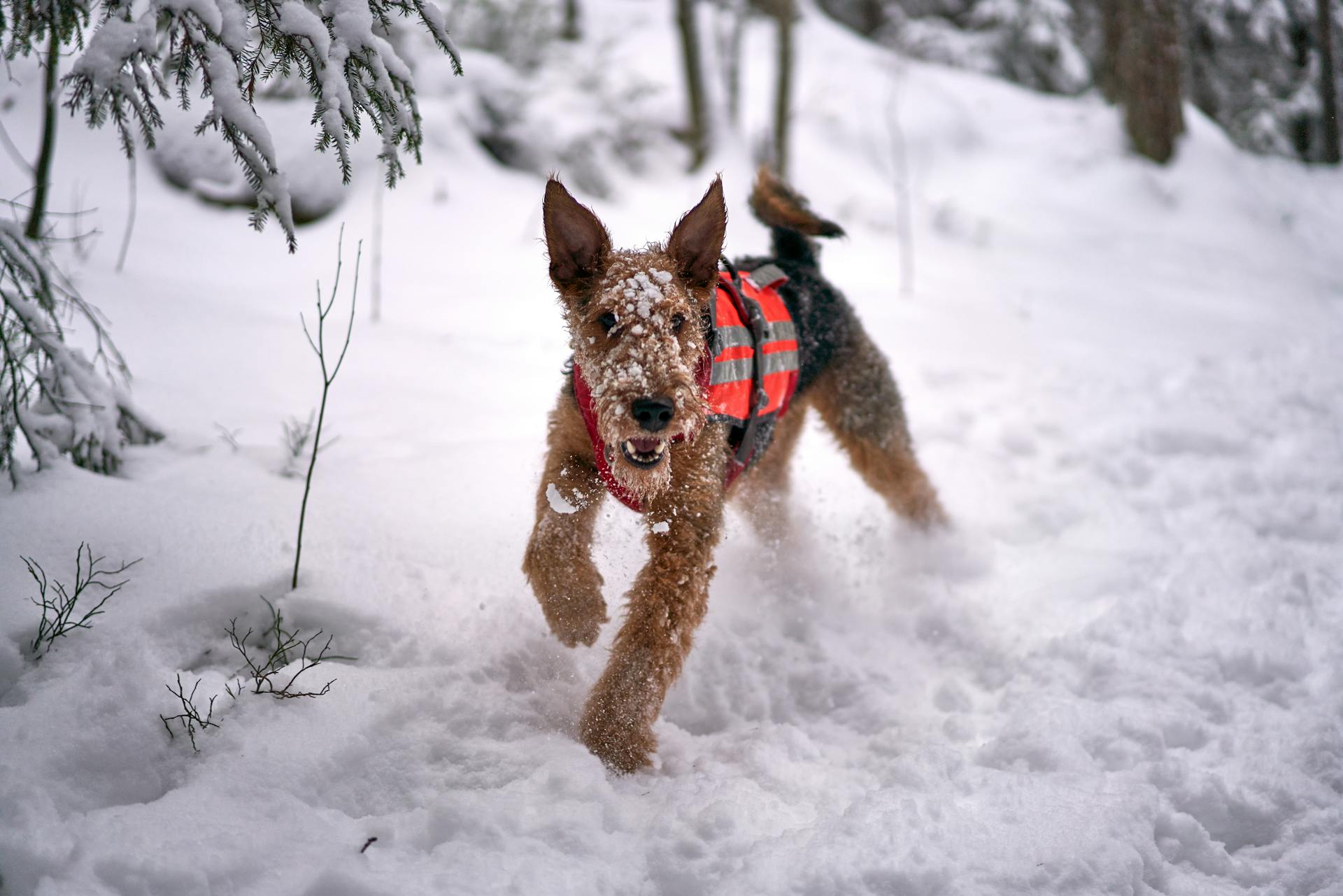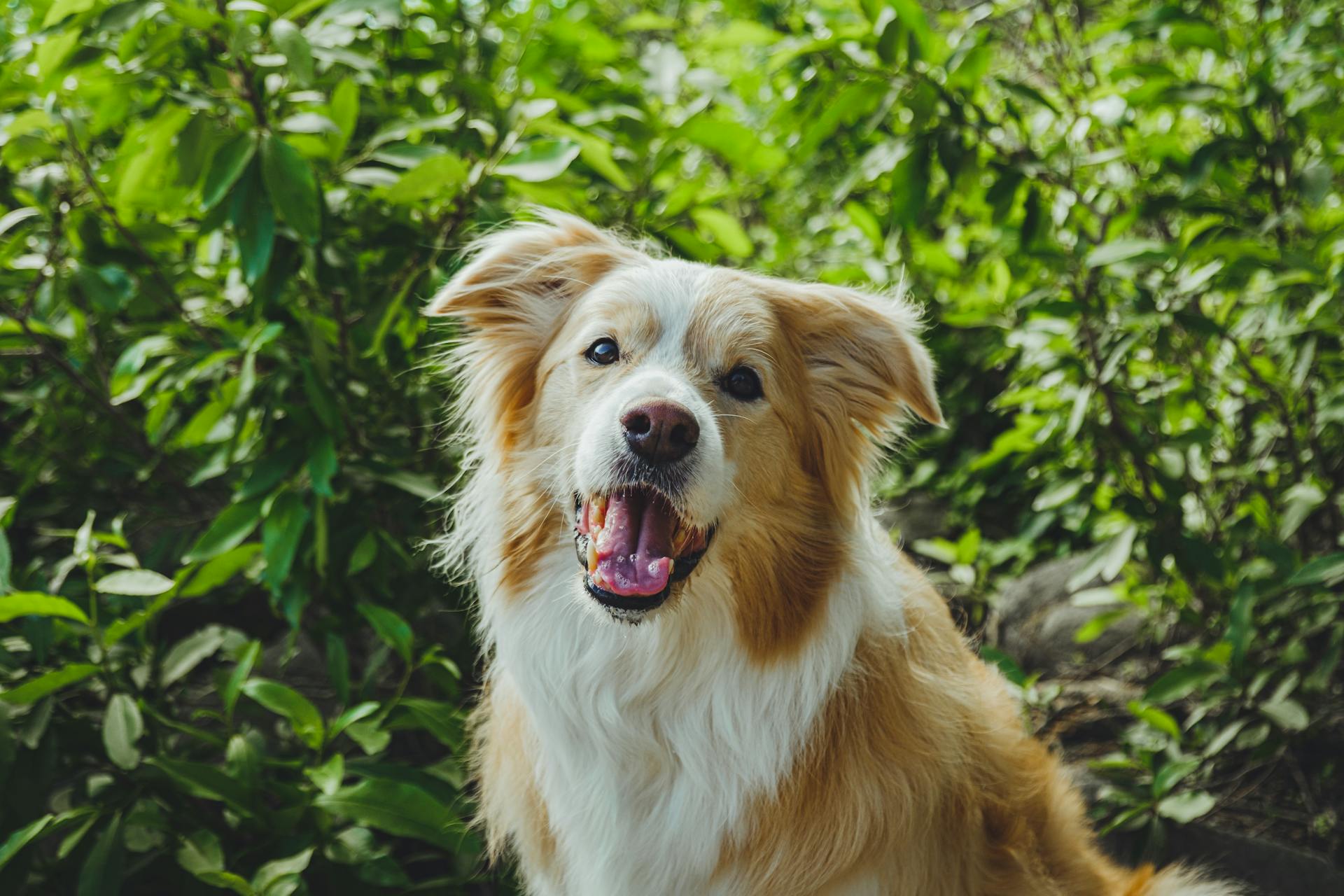
The Tenterfield Terrier is a small, affectionate dog breed that originated in Australia in the 19th century.
They are a rare breed, but their unique appearance and friendly nature have made them a favorite among dog enthusiasts.
The Tenterfield Terrier is a small dog, weighing between 6-9 kg and standing at 25-30 cm tall.
They have a short, smooth coat that requires minimal grooming.
On a similar theme: Apbt Breed Standard
Origin & History
The Tenterfield Terrier's origin story dates back to the 19th century in Australia.
These feisty dogs were brought to Australia by early English settlers, who valued their small size and exceptional vermin-hunting abilities.
They were originally called Mini Foxies, but this name was deemed inappropriate because it referred to the miniaturization of Smooth Coated Terriers.
The breed's name was officially changed to Tenterfield Terrier in the early 1990s, in part to honor George Woolnough, a saddler who owned and bred these little dogs.
Tenterfield Terriers were developed from Miniature Fox Terriers, and their origins can be traced back to the now-extinct Old English White Terrier.
Here's an interesting read: Australian German Shepherds
The breed quickly became popular throughout the Australian countryside, not just as an effective way to eradicate disease-carrying pests, but also as hunting dogs for small game and as family companions.
Tenterfield Terriers were often seen accompanying their British companions on ships, where they would hunt and kill vermin.
The breed's small size and agility made them indispensable shipmates on the grueling months-long voyage to Australia.
The Tenterfield Terrier Club of Australia was formed in 1993, and the breed received recognition from the Australian National Kennel Council in 2002.
Tenterfield Terriers were originally bred to be small enough to chase vermin out of burrows, but with the strength and agility to jump up onto a horse's saddle with their master.
Explore further: History of the American Bully
Characteristics
The Tenterfield Terrier is a small but mighty dog breed. They have strength beyond their small stature.
Their intelligence is one of their most notable characteristics, making them highly adaptable to a variety of situations. They can thrive in a range of environments, from farmland to small apartments.
They are extremely agile, which is essential for their job of ridding their territory of vermin. This agility also makes them great companions for active owners.
They are just as happy curled up on a lap as they are roaming farmland or playing with a toy.
Worth a look: Tiny Yorkshire Terrier Puppy
Care and Maintenance
The Tenterfield Terrier is a low-maintenance breed that's perfect for busy owners. Their short, smooth coat requires only occasional brushing, and a good quality bristle brush is all you need to keep it healthy and smooth.
A simple "wash and wear" is all that's required for their coat, but be sure to trim any untidy bits if you're planning to show your Tenterfield. Regular nail trims, dental cleanings, and deworming are also essential for their overall health.
You don't need to bathe your Tenterfield Terrier too often, as they tend to have a mild doggy odor. In fact, over-bathing can lead to skin issues or contact allergies. A few baths a year should be sufficient, but be sure to check their ears regularly to prevent infections.
To keep your Tenterfield's coat looking its best, brush it several times a week. A bristle brush is the perfect tool for this, as it helps distribute natural oils and remove loose hair. Don't forget to trim their nails to a comfortable length, as long nails can cause pain and other issues.
You might enjoy: Smooth Fox Terrier Breeders
Dental hygiene is crucial for your Tenterfield's overall health. Brush their teeth at least three times a week, and consider using a small dog-friendly toothbrush and toothpaste. Regular professional cleanings and a good at-home dental care program can help prevent dental disease, which is common in small breeds like the Tenterfield.
Here's a quick rundown of the essential grooming tasks for your Tenterfield Terrier:
- Brush their coat several times a week
- Trim their nails once a month
- Brush their teeth at least three times a week
- Check and clean their ears regularly
Health and Suitability
Tenterfield Terriers are known for living a long life of anywhere from 12 to 20 years, with no major health issues. They're a great choice for families with young children, as they're very compatible with other pets if introduced as a puppy.
Tenterfields are suitable for all types of people, from the elderly to young children, making them a versatile breed. They can endure many miles of walking, if the owner enjoys being active, and are equally happy living indoors or out.
Some people have misinterpreted a Tenterfield Terrier's vocal enthusiasm as aggression, but they're generally not in any way hostile. If well socialised, there should be no issues.
For another approach, see: Border Terrier Diseases
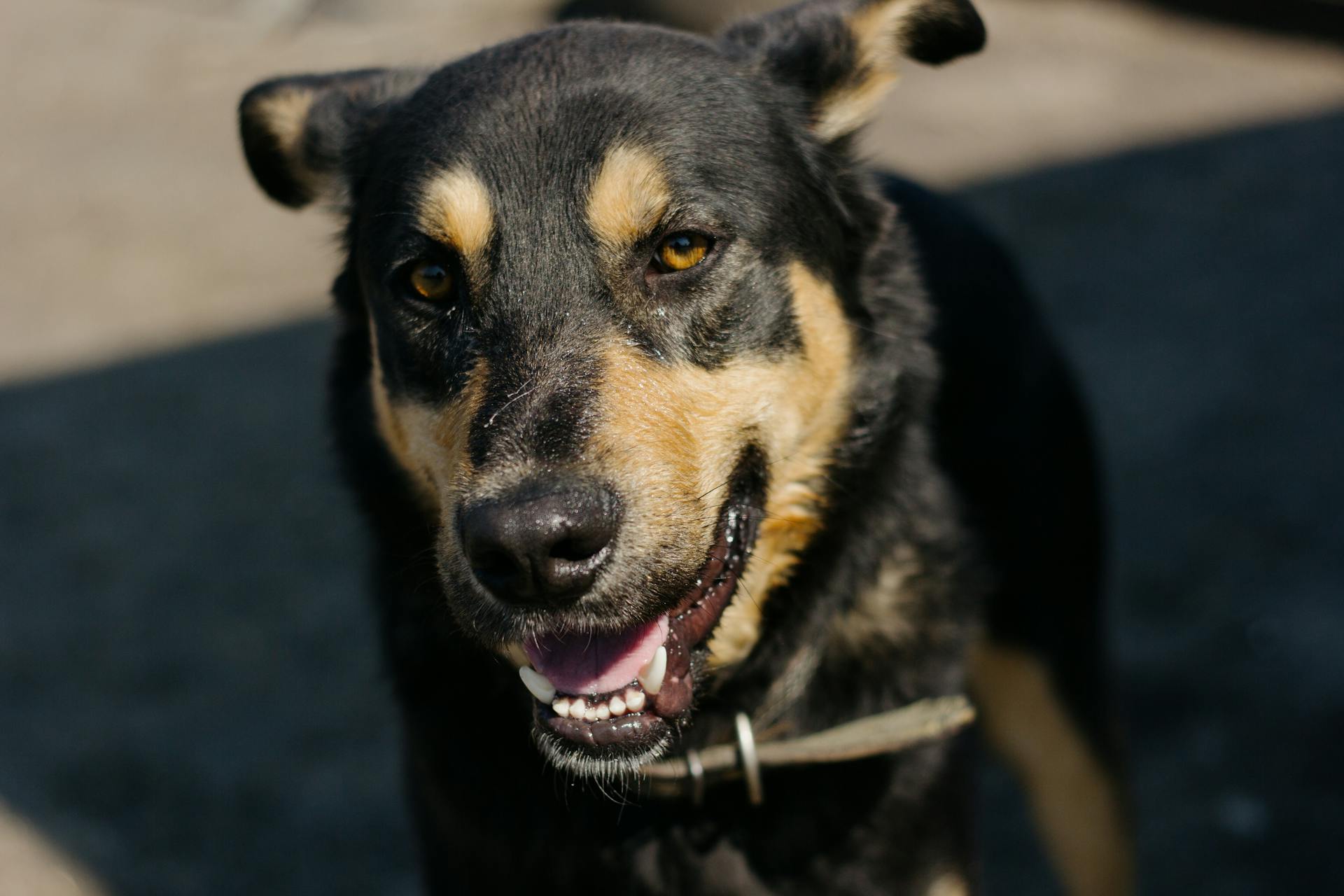
Tenterfield Terriers are prone to a few health issues, including congenital hypothyroidism with goitre and primary lens luxation. The national Tenterfield community is taking action to protect the breed, including testing to prevent affected puppies being produced.
To identify potential health issues, you can consider genetic testing, such as Wisdom Panel Premium, which can provide results for over 200 genetic health tests.
A different take: Bull Terrier Issues
Temperament & Intelligence
Tenterfield Terriers are highly energetic breeds that thrive on daily exercise and outdoor activities. They love going on walks and playing at the dog park.
They are naturally curious and love to observe their environment, often alerting their owners to something with continuous barking. This breed can be prone to excessive barking if not trained properly.
Tenterfield Terriers are incredibly playful and enjoy spending time with their family members and other dogs. They have a strong prey drive and may chase cats or other small pets.
This breed is highly intelligent and responds well to positive reinforcement training methods. However, they can be stubborn and independent at times, making training a bit challenging.
Early socialization and training are crucial for Tenterfield Terrier puppies to prevent them from becoming stubborn as adults. They are very vocal and will bark to get attention or alert their owners to something.
Tenterfield Terriers are loyal and affectionate towards their families and make great companions. However, they may require a great deal of socialization to get along with other dogs.
They are naturally alert and make suitable watchdogs, but they can also be prone to barking and separation anxiety. This breed is not suitable for people who are away from home for extended periods.
Tenterfield Terriers are known to be particularly good with children, especially older kids who know how to interact with dogs properly. However, they may not be the best choice for families with young children due to their high energy levels and barking.
You might like: American Pit Bull Terrier Temperament Intelligent
Owning a Dog
Tenterfield Terriers are adaptable to various family environments, making them a great fit for many households.
They get along well with families that have both young and older children, but they tend to prefer older children who know how to handle and interact with dogs properly.
Tenterfield Terriers are happy to be left alone for a few hours each day if they have something to keep them busy, but they do prefer to be around their family and join in on outdoor activities.
Their excessive barking can be a challenge for families that value a quiet lifestyle or have young children who may be disturbed by the noise.
Explore further: Are Pit Bulls Good Family Dogs
Nutrition
Tenterfield Terriers are active dogs that require a diet formulated for small breeds. This means they thrive on high-quality dog food that's AAFCO-approved.
To ensure your Tenterfield Terrier stays healthy, you should be mindful of their food intake to prevent excessive weight gain. A diet rich in animal-based protein is recommended, alongside a balance of carbohydrates, fats, and essential vitamins and minerals.
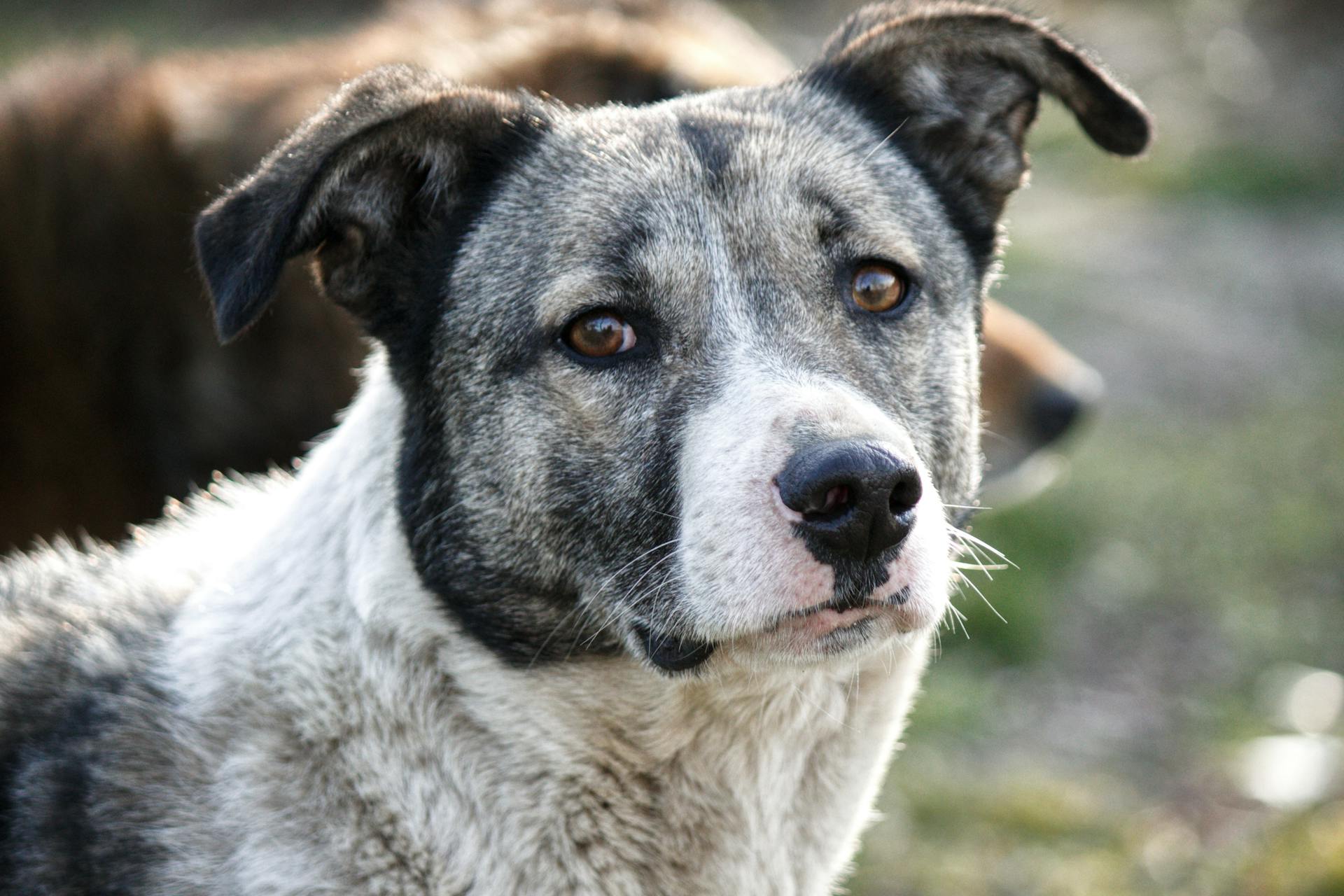
Puppies have different dietary needs than adults, so you may need to adjust their diet accordingly. Young and growing Tenterfield Terrier puppies eat smaller, more frequent meals throughout the day.
To maintain a healthy weight, measure your Tenterfield Terrier's portions carefully, as overfeeding can lead to weight issues. Treats should make up no more than 10% of their daily calories.
Readers also liked: Rat Terrier Size and Weight
Frequently Asked Questions
What is the difference between a jack russell terrier and a Tenterfield Terrier?
The Tenterfield Terrier has a finer build and a slightly arched skull compared to the Jack Russell Terrier. They also have distinct temperaments, with Tenterfield Terriers being known for their bold and curious nature.
Are tenterfield terriers yappy?
Tenterfield terriers are prone to barking, but consistent training can help minimize the noise. With proper training, they can learn to be quieter companions.
Is a Tenterfield Terrier the same as a Mini Foxie?
No, the Tenterfield Terrier is a distinct breed from the Mini Foxie, which is now an outdated name. The ANKC officially recognized the Tenterfield Terrier as a separate breed, replacing the Mini Foxie name.
Is a Tenterfield Terrier a Jack Russell?
While the Tenterfield Terrier shares ancestry with the Jack Russell Terrier, it is a distinct breed with its own unique characteristics. The Tenterfield Terrier's breeding history is a mix of various terrier breeds, including the Fox Terrier.
Sources
Featured Images: pexels.com
